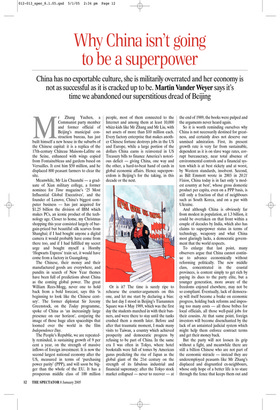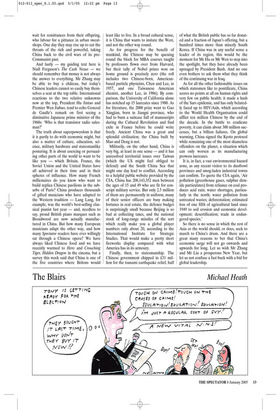Why China isn’t going to be a superpower
China has no exportable culture, she is militarily overrated and her economy is not as successful as it is cracked up to be. Martin Vander Weyer says it’s time we abandoned our superstitious dread of Beijing Mr Zhang Yuchen, a Communist party member and former official of Beijing’s municipal construction bureau, has just built himself a new house in the suburbs of the Chinese capital: it is a replica of the 17th-century Château Maisons-Lafitte on the Seine, enhanced with wings copied from Fontainebleau and gardens based on Versailles. It cost him $50 million, and he displaced 800 peasant farmers to clear the site.
Meanwhile, Mr Liu Chuanzhi — a graduate of Xian military college, a former nominee for Time magazine’s ‘25 Most Influential Global Executives’, and the founder of Lenovo, China’s biggest computer business — has just acquired for $1.25 billion the division of IBM which makes PCs, an iconic product of the technology age. Closer to home, my Christmas shopping this year consisted largely of bargain-priced but beautiful silk scarves from Shanghai; if I had bought anyone a digital camera it would probably have come from there too, and if I had fulfilled my secret urge and bought myself a Hornby ‘Hogwarts Express’ train set, it would have come from a factory in Guangdong.
The Chinese, their money and their manufactured goods are everywhere, and pundits in search of New Year themes have been full of predictions about China as the coming global power. The great William Rees-Mogg, never one to hold back from a bold forecast, says this ‘is beginning to look like the Chinese century’. The former diplomat Sir Jeremy Greenstock, on the Today programme, spoke of China as ‘an increasingly large presence on our horizon’, conjuring the image of those huge alien spaceships that loomed over the world in the film Independence Day.
The People’s Republic, we are repeatedly reminded, is sustaining growth of 9 per cent a year, on the strength of massive inflows of foreign investment. It is now the second largest national economy after the US, measured in terms of ‘purchasing power parity’ (PPP), and will soon be bigger than the whole of the EU. It has a prosperous middle class of 100 million people, most of them connected to the Internet and among them at least 10,000 whizz-kids like Mr Zhang and Mr Liu, with net assets of more than $10 million each. Every factory enterprise that makes another Chinese fortune destroys jobs in the US and Europe, while a large portion of the dollars China earns is reinvested in US Treasury bills to finance America’s notorious deficit — giving China, one way and the other, a hard-to-beat hand of cards in global economic affairs. Hence superpowerdom is Beijing’s for the taking, in this decade or the next.
Or is it? The time is surely ripe to rehearse the counter-arguments on this one, and let me start by declaring a bias: the last day I stood in Beijing’s Tiananmen Square was 4 May 1989, which was the first day the students marched in with their banners, and were there to stay until the tanks crushed them a month later. Before and after that traumatic moment, I made many visits to Taiwan, a country which achieved prosperity and democratic progress by refusing to be part of China. In the same era I was often in Tokyo, where hotel bookstalls were full of tomes by American gurus predicting the rise of Japan as the global giant of the 21st century on the strength of its fabulous industrial and financial supremacy; after the Tokyo stock market collapsed — never to recover — at the end of 1989, the books were pulped and the arguments never heard again.
So it is worth reminding ourselves why China is not necessarily destined for greatness, and certainly does not deserve our unmixed admiration. First, its present growth rate is very far from sustainable, dependent as it is on slave wage rates, corrupt bureaucracy, near total absence of environmental controls and a financial system which is at best rickety and at worst, by Western standards, insolvent. Second, as Bill Emmott wrote in 2003 in 20:21 Vision, China today is in fact only ‘a modest country at best’, whose gross domestic product per capita, even on a PPP basis, is still only a fraction of that of neighbours such as South Korea, and on a par with Ukraine.
And although China is obviously far from modest in population, at 1.3 billion, it could be overtaken on that front within a couple of decades by India, which also has claims to superpower status in terms of technology, weaponry and what China most glaringly lacks, a democratic government that the world respects.
To enlarge that last point, many observers argue that China cannot continue to advance economically without reforming politically. The new middle class, concentrated in the coastal provinces, is content simply to get rich by paying its dues to the party elite, but a younger generation, more aware of the freedoms enjoyed elsewhere, may not be so compliant. Eventually, lack of democracy will itself become a brake on economic progress, holding back reforms and imposing too many costs — all those bribes for local officials, all those well-paid jobs for their cousins. At that same point, foreign investors will become disenchanted by the lack of an untainted judicial system which might help them enforce contract terms and get their money back.
But the party will not loosen its grip without a fight, and meanwhile there are still a billion Chinese who are not part of the economic miracle — instead they are underemployed peasants like Mr Zhang’s displaced and disgruntled ex-neighbours, whose only hope of a better life is to stare through the fence that keeps them out and wait for remittances from their offspring, who labour for a pittance in urban sweatshops. One day they may rise up to cut the throats of the rich and powerful, taking China back to the civil wars of its preCommunist past.
And lastly — my guiding text here is Niall Ferguson’s The Cash Nexus — we should remember that money is not always the answer to everything. Mr Zhang may be able to buy a château, but today’s Chinese leaders cannot so easily buy themselves a seat at the top table. International reactions to the two relative unknowns now at the top, President Hu Jintao and Premier Wen Jiabao, tend to echo General de Gaulle’s remark on first seeing a diminutive Japanese prime minister of the 1960s: ‘Who is that transistor radio salesman?’ The truth about superpowerdom is that it is partly to do with economic might, but also a matter of culture, education, science, military hardware and statesmanlike posturing. It is about coercing or persuading other parts of the world to want to be like you — which Britain, France, the Soviet Union and the United States have all achieved in their time and in their spheres of influence. How many French millionaires do you know who want to build replica Chinese pavilions in the suburbs of Paris? China produces thousands of gifted musicians who have adapted to the Western tradition — Lang Lang, for example, was the world’s best-selling classical pianist last year — and, needless to say, proud British piano marques such as Broadwood are now actually manufactured in China. But how many European musicians adapt the other way, and how many Spectator readers have ever willingly sat through a Chinese opera? We have always liked Chinese food and we have recently warmed to Hero and Crouching Tiger, Hidden Dragon in the cinema, but a survey this week said that China is one of the five countries where Britons would least like to live. In a broad cultural sense, it is China that wants to imitate the West, and not the other way round.
As for progress for the benefit of mankind, the Chinese may be queuing round the block for MBA courses taught by professors flown over from Harvard, but their tally of Nobel prizes won on home ground is precisely zero (the roll includes two Chinese-born, Americanbased particle physicists, Chen and Lee, in 1957, and one Taiwanese American chemist, another Lee, in 1986). By comparison, the University of California alone has notched up 15 laureates since 1980. As for literature, the 2000 prize went to Gao Xingjian, born in Jiangxi province, who had to burn a suitcase full of manuscripts during the Cultural Revolution and find exile in France before he could write freely. Ancient China was a great and splendid civilisation; the China built by Mao and Deng is not.
Militarily, on the other hand, China is very big, at least in one sense — and it has unresolved territorial issues over Taiwan (which the US might feel obliged to defend) and the South China Sea that might one day lead to conflict. According to a helpful public website provided by the CIA, China has 208,143,352 men between the ages of 15 and 49 who are fit for conscript military service. But only 2.5 million of them are permanently in uniform, many of their senior officers are busy making fortunes in real estate, the defence budget is surprisingly small because Beijing is so bad at collecting taxes, and the national stock of long-range missiles of the sort which really make you a global player numbers only about 20, according to the International Institute for Strategic Studies. That would make a pretty short fireworks display compared with what America has in its armoury.
Finally, then, to statesmanship. The Chinese government chipped in £31 million for the tsunami earthquake relief, half of what the British public has so far donated and a fraction of Japan’s offering, but a hundred times more than miserly South Korea. If China was in any useful sense a leader of its region, this would be the moment for Mr Hu or Mr Wen to step into the spotlight, but they have already been upstaged by President Bush. And no one even bothers to ask them what they think of the continuing war in Iraq.
As for all the other fashionable issues on which statesmen like to pontificate, China scores no points at all on human rights and very few on public health: it made a hash of the Sars epidemic, and has only belatedly faced up to HIV/Aids, which according to the World Health Organisation could afflict ten million Chinese by the end of the decade. In the battle to eradicate poverty, it can claim about 300 million successes, but a billion failures. On global warming, China signed the Kyoto protocol while remaining one of the most shameless offenders on the planet, a situation which can only worsen as its manufacturing prowess increases.
It is, in fact, a vast environmental hazard zone, as any recent visitor to its dustbowl provinces and smog-laden industrial towns can confirm. To quote the CIA again, ‘Air pollution (greenhouse gases, sulphur dioxide particulates) from reliance on coal produces acid rain; water shortages, particularly in the north; water pollution from untreated wastes; deforestation; estimated loss of one fifth of agricultural land since 1949 to soil erosion and economic development; desertification; trade in endangered species.’ So there is no sense in which the rest of Asia or the world should, or does, seek to march to China’s drum. And there are a great many reasons to bet that China’s economic surge will not go onwards and upwards for long. Let us wish Mr Zhang and Mr Liu a prosperous New Year, but let us not confuse a fast buck with a bid for global leadership.











































 Previous page
Previous page